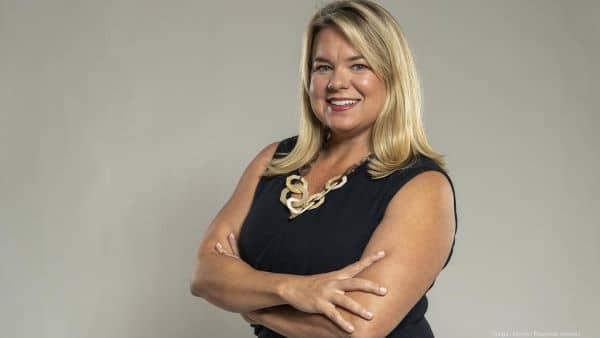Council Member Rebecca Holmes’ Perspective on Colorado’s Educational Landscape
Conversations around educational success and college and career readiness have been central to the work of many of El Pomar’s Regional Councils over the years. In the Metro region, the Council is committed to bolstering student development, most recently initiating multi-year grants in three Denver middle schools and funding summer programming to support at-risk youth. Given the Metro Council’s interest in supporting students in the Metro region, as well as the growing conversations around learning loss and other impacts as a result of the pandemic, Metro Fellow Reilly Torres took this opportunity to ask Council Member Rebecca Holmes about her observations on pressing issues and potential solutions. Rebecca is CEO of Colorado Education Initiative (CEI), which has worked since 2007 to cultivate systems improvement, innovation, and equity in K-12 education throughout Colorado. CEI is grounded in the long-term vision that every student in the state is prepared and unafraid to succeed in school, work and life and ready to take on the challenges of today, tomorrow and beyond.
Reilly: The past two years have been some of the hardest in education in recent history. How are you thinking about innovation in Colorado’s current educational landscape? What are the major challenges and opportunities that are shaping how we imagine and implement new educational practices and structures?
Rebecca: In CEI’s work implementing innovation and improvement projects in Colorado over the past year, we have witnessed a disconnect between unprecedented opportunities for transformation, such as stimulus funding and policy windows, and the difficult post-COVID conditions in many schools and districts. COVID exacerbated and shined a public spotlight on components of K-12 education systems that are so entrenched, they persist despite this potentially transformational moment. Major challenges that concern us include:
- An impending dropout crisis with students and families questioning the relevance of traditional schooling and approaches to grading that are more likely to accelerate disengagement than incentivize reengagement
- A youth mental health crisis that, while not new, has reached such urgent levels it spans systems as both a public health and public education challenge
- A teacher shortage that will not only outlast the pandemic but may upend the teaching profession and the delivery of instruction as we know it today
Still, we work with partners who are preparing to use this moment for long-term innovation and have been bright spots across the state for some time. From this work, we’ve identified two fundamental shifts necessary for districts to leverage stimulus funding and other recovery opportunities to pave the way for a new future of education:
- Breaking down silos between public systems. Taking on cross-sector challenges requires authentic cross-sector collaboration. This includes opportunity for partnership across early childhood, out-of-school time, K-12, higher education, workforce and public health systems.
- Building new infrastructure and behavior between families and schools. Ensuring a high return on investment of state and federal funds requires high-impact family partnership to build and sustain community-driven change.
Reilly: Can you share what this shift looks like in practice? How are school districts in Colorado integrating with local communities and public systems to foster community and student success?
Rebecca: CEI’s view is that if education is not playing a role in community development and if student engagement in community development is not part of their school experience or measures of success, we’re doing something wrong. We’ve seen and been proud to support great examples of deep integration between education systems and local communities, particularly in the realm of community economic development.
Rural and urban districts alike are expanding college and career pathways and course offerings that provide students opportunities to explore and develop their passions, gain real-world skills and get hands-on experience that prepare them for success after high school. One of the most robust examples of this is the Homegrown Talent Initiative (HTI), through which CEI and Colorado Succeeds are partnering with eight rural school districts in a multi-year effort to create job-readiness skills in the local population by connecting the interests of high school students with the needs and demands of local businesses and employers.
Reilly: That’s a great example of synergy between education and public systems. Can you also speak about how schools and districts are collaborating with communities to build trust and create a vision for educational success?
Rebecca: Two great examples of community-informed strategic plans come to mind.
Greeley-Evans School District 6 launched a family and community engagement process to drive and build capacity for high impact partnerships aligned with their Innovation 2030 Strategic Plan. Led by Assistant Superintendent Stacie Datteri, Director of Cultural Excellence and Parent Engagement Jesse Tijerina and Family Center Coordinator David Reyes, Greeley organized a core team to conduct empathy interviews and gather feedback from family members, teachers, and leaders from a variety of backgrounds on community needs for family partnership. The team used this work to construct a vision statement, guiding beliefs and strategic objectives that will be formalized in partnership with their school board this spring.
The second example relates to CEI’s work on rethinking school accountability measures. We’re seeing increased awareness and urgency among bipartisan leaders about the need for a system that families, educators and students believe in and are served by—issues recently written about by Rick Hess and Forbes. The Colorado legislature approved an accountability pilot in 2019 that supports 41 districts and school grantees in rethinking school quality measures with their communities in ways that provide information their stakeholders value and can use for continuous improvement.
One of the Metro Regional Council’s multi-year grant partners, Compass Academy, is leading the way with an important pilot. The school was designed to prioritize social emotional development—something that isn’t (and arguably shouldn’t be) measured in a high stakes state accountability system but risks deprioritization in many schools because of our current system. Compass Academy revamped its strategic planning process in 2021 to design and use a more human-centered approach to advancing major school improvement strategies. A focus of this work included family and community partnerships to build indicators aligned to the school’s priority areas of academics, whole child and culture. Led by Executive Director Marcia Fulton, school leaders launched a community and stakeholder engagement plan to elevate traditionally marginalized voices, design systems through which family and community members inform a set of holistic measures of student success and create transparent tools for tracking and sharing progress toward these goals. The Compass team has rolled out a draft rubric and dashboard for ongoing family and community engagement as a result of this work. This quote from that rubric summarizes the approach that Compass Academy used and that we believe can inspire an approach to local quality measures with real buy-in:
“We have spent hours digesting the voices of our community through surveys, listening sessions and in our everyday conversations… We will continue to leverage systems and structures to ensure that those who are most impacted are ‘in the room where it happens’ as we continue to refine our school improvement process and platform.”
To learn more about the Metro Regional Council’s work, click here.



